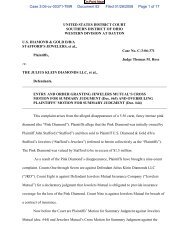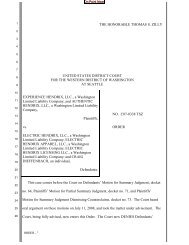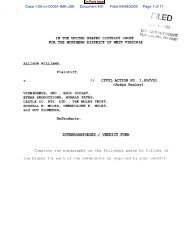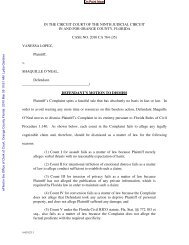GORDON KEENE VELLA. - On Point News
GORDON KEENE VELLA. - On Point News
GORDON KEENE VELLA. - On Point News
You also want an ePaper? Increase the reach of your titles
YUMPU automatically turns print PDFs into web optimized ePapers that Google loves.
Similarly, in another prospective study cited by Dr. Brown, a survey showed that some<br />
individuals with confirmed abuse histories failed to mention their abuse when asked about it by<br />
survey interviewers (e.g., Widom & Morris, 1997; cited in Exhibit 7, p. 9). The study authors,<br />
however, emphasized that it was not known whether the nondisclosure was due to “loss of<br />
memory, denial, or embarrassment is not known.” <strong>On</strong>e cannot equate a failure to disclose with<br />
an inability to remember. (McNally Decl. 10, citing Widom & Morris, 1997, p. 44.) Yet, Dr.<br />
Brown repeatedly does so.<br />
Dr. Brown also references a recent study by Bonanno in his Report, as supporting the<br />
hypothesis of dissociative amnesia, despite the fact that “Bonanno and colleagues report no<br />
evidence of ‘dissociative amnesia.’” (Pope Decl. 29.) In the Bonanno study, a group of 67<br />
documented victims of sexual abuse were interviewed concerning the most distressful event or<br />
series of events they had ever experienced. The interviewers did not disclose to the subjects that<br />
they were aware of the previous sexual abuse. In response to the initial question to identify the<br />
“most distressful event,” only 44 (66%) of the interviewees described the experience of sexual<br />
abuse, whereas 23 (34%) did not. The interviewers then conducted a second, structured<br />
interview asking more directly about sexual abuse experiences. “<strong>On</strong> this second interview,<br />
virtually all of the formerly non-disclosing subjects acknowledged experiences of sexual abuse,<br />
with only 2 still denying abuse.” (Pope Decl. 28.) Even in relation to these final two subjects,<br />
Bonanno and colleagues made no suggestion that they suffered from “dissociative amnesia,”<br />
because both subjects displayed high levels of shame during the interview process, suggesting<br />
that they had not forgotten the abuse, but were simply choosing to withhold the information from<br />
the interviewer. (Id.)<br />
- 18 -
















